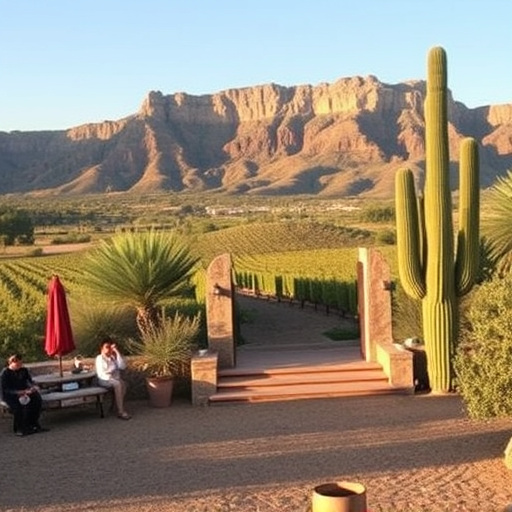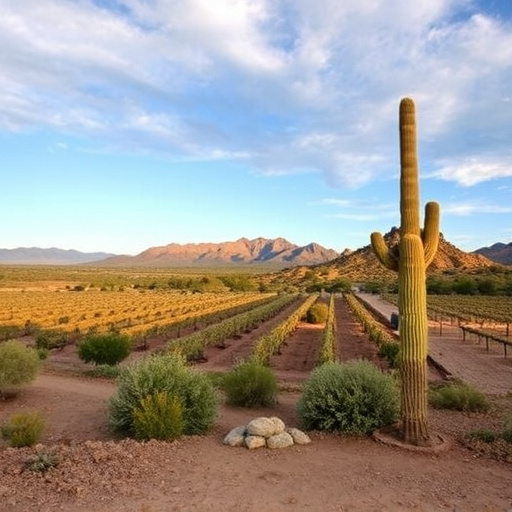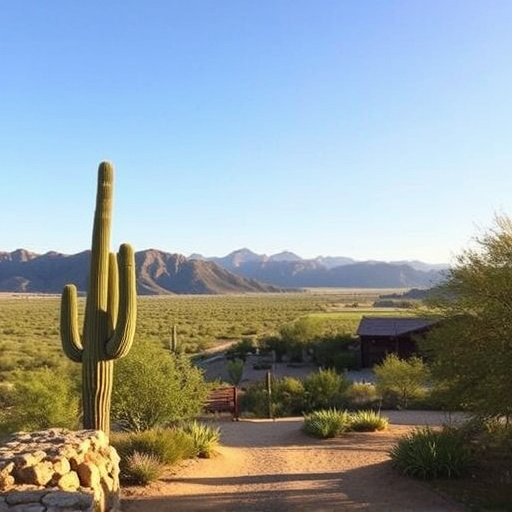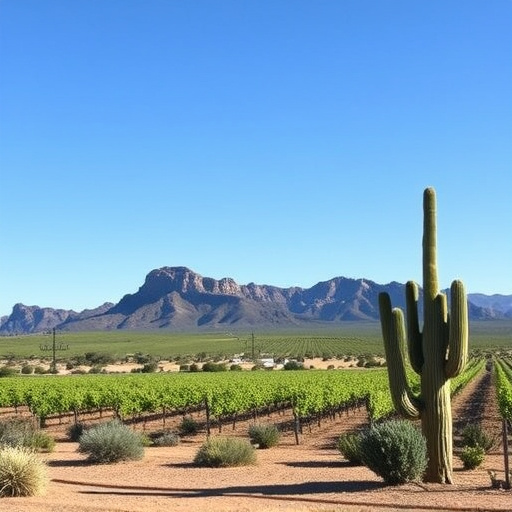In Southern Arizona's thriving wine country, organic viticulture is a way of life, with educational wineries offering immersive experiences that blend sustainable practices and high-quality wines. These establishments serve as living classrooms, attracting professionals and enthusiasts to learn about innovative techniques like cover cropping and water conservation. By prioritizing environmental protection and enhancing terroir, these wineries lead the charge in sustainable wine production, positioning Southern Arizona as a global leader and attracting eco-conscious tourists.
Discover the art of organic viticulture in Southern Arizona’s thriving wine country. This region has emerged as a hotbed for educational vineyards, offering unique learning opportunities for aspiring winemakers. Explore these sustainable practices and their growing impact on the local industry. From hands-on training to innovative case studies, these wineries are not just producing exceptional wines but also shaping the future of Arizona’s wine culture through organic methods.
- Exploring Organic Viticulture: A Unique Approach in Southern Arizona's Wine Country
- The Rise of Educational Vineyards: Learning from the Experts
- Wineries as Centers for Sustainable Wine Production: A Case Study
- Hands-On Experience: Practical Training at These Educational Outposts
- Benefits and Impact: How These Methods Shape the Future of Arizona's Wine Industry
Exploring Organic Viticulture: A Unique Approach in Southern Arizona's Wine Country

In the heart of Southern Arizona’s wine country, a unique and sustainable approach to winemaking is taking root—organic viticulture. This method prioritizes natural processes and minimal interference, fostering a healthier ecosystem within vineyards. By forgoing synthetic chemicals and embracing organic practices, winemakers in this region are not only producing high-quality wines but also contributing to the preservation of the land.
Educational vineyards throughout Southern Arizona offer visitors an immersive experience where they can learn firsthand about these organic methods. Tourists can explore the lush landscapes, interact with knowledgeable viticulturists, and gain insights into sustainable farming techniques. These wineries serve as living classrooms, showcasing how organic viticulture enhances both wine quality and environmental sustainability, making them must-visit destinations for enthusiasts seeking an authentic, educational experience amidst the region’s vibrant wine culture.
The Rise of Educational Vineyards: Learning from the Experts
In recent years, there’s been a notable rise in educational vineyards across various wine-producing regions, including Southern Arizona. These wineries serve as living classrooms for aspiring viticulturists and wine enthusiasts eager to learn organic viticulture methods. By immersing themselves in these environments, students gain firsthand experience from industry experts who have honed their craft through sustainable practices.
Southern Arizona’s diverse climate and soil types offer a unique opportunity for experimentation, making it an ideal setting for educational vineyards. These establishments often showcase innovative techniques such as cover cropping, organic pest management, and water conservation methods that are transforming the wine industry. Whether you’re a professional viticulturist or simply curious about sustainable winemaking, these wineries provide an immersive experience where theory meets practice, allowing visitors to learn from the experts who cultivate some of the region’s finest wines.
Wineries as Centers for Sustainable Wine Production: A Case Study

Wineries in Southern Arizona are serving as hubs for sustainable wine production, showcasing organic viticulture methods that promote environmental stewardship and high-quality wine. These wineries embrace natural practices, such as minimizing chemical use, implementing integrated pest management, and utilizing renewable energy sources. By adopting these strategies, they contribute to the preservation of local ecosystems while producing wines with distinct character and terroir.
Take a dive into the vibrant landscape of Southern Arizona’s wineries, where the art of winemaking meets ecological consciousness. This case study highlights their commitment to sustainable practices, positioning them as trailblazers in the industry. Their efforts not only ensure the long-term viability of wine production but also enrich the region’s natural heritage for future generations to enjoy.
Hands-On Experience: Practical Training at These Educational Outposts

At educational vineyards, aspiring winemakers and viticulture enthusiasts have the unique opportunity to gain hands-on experience in a real-world setting. These wineries in southern Arizona often serve as living classrooms where visitors can learn organic viticulture methods by doing. Through practical training, they engage directly with every aspect of vineyard management, from pruning and canopy management to soil analysis and disease prevention. This immersive approach allows individuals to apply theoretical knowledge, fostering a deeper understanding of sustainable wine production.
Practical training at these educational vineyards provides an invaluable experience that goes beyond classroom instruction. Participants learn firsthand the challenges and rewards of organic viticulture, enabling them to contribute meaningfully to the growing movement towards sustainable wine-making practices. By immersing oneself in this environment, one can develop essential skills and build a network of industry professionals, setting a solid foundation for future careers in the wine industry.
Benefits and Impact: How These Methods Shape the Future of Arizona's Wine Industry

The adoption of organic viticulture methods by educational vineyards in Southern Arizona is transforming the state’s wine industry. These practices, focused on minimizing external interventions and fostering ecological balance, have significant benefits. Winemakers are discovering that healthier vines lead to more resilient and diverse wine profiles, appealing to both consumers and sommeliers worldwide. By eliminating synthetic pesticides and fertilizers, these organic methods also contribute to environmental sustainability, reducing the industry’s carbon footprint.
Moreover, showcasing these practices at educational vineyards attracts tourists and wine enthusiasts interested in eco-conscious choices. This trend encourages collaboration among local wineries, fostering knowledge sharing and innovation. As Arizona’s wine culture evolves, these sustainable practices position the state as a leader in organic viticulture, potentially attracting new businesses and boosting the economy while preserving the region’s unique terroir for future generations of winemakers.
Educational vineyards in Southern Arizona’s thriving wine country are revolutionizing organic viticulture, offering hands-on training and sustainable practices that shape the future of the region’s industry. By immersing oneself in these learning centers, one gains valuable insights into innovative methods, from natural pest management to sustainable water usage, all vital for producing high-quality wines while preserving the environment. The rise of such vineyards not only benefits local winemakers but also ensures Arizona remains a prominent player on the global wine stage, showcasing its unique terroir and commitment to organic principles.
